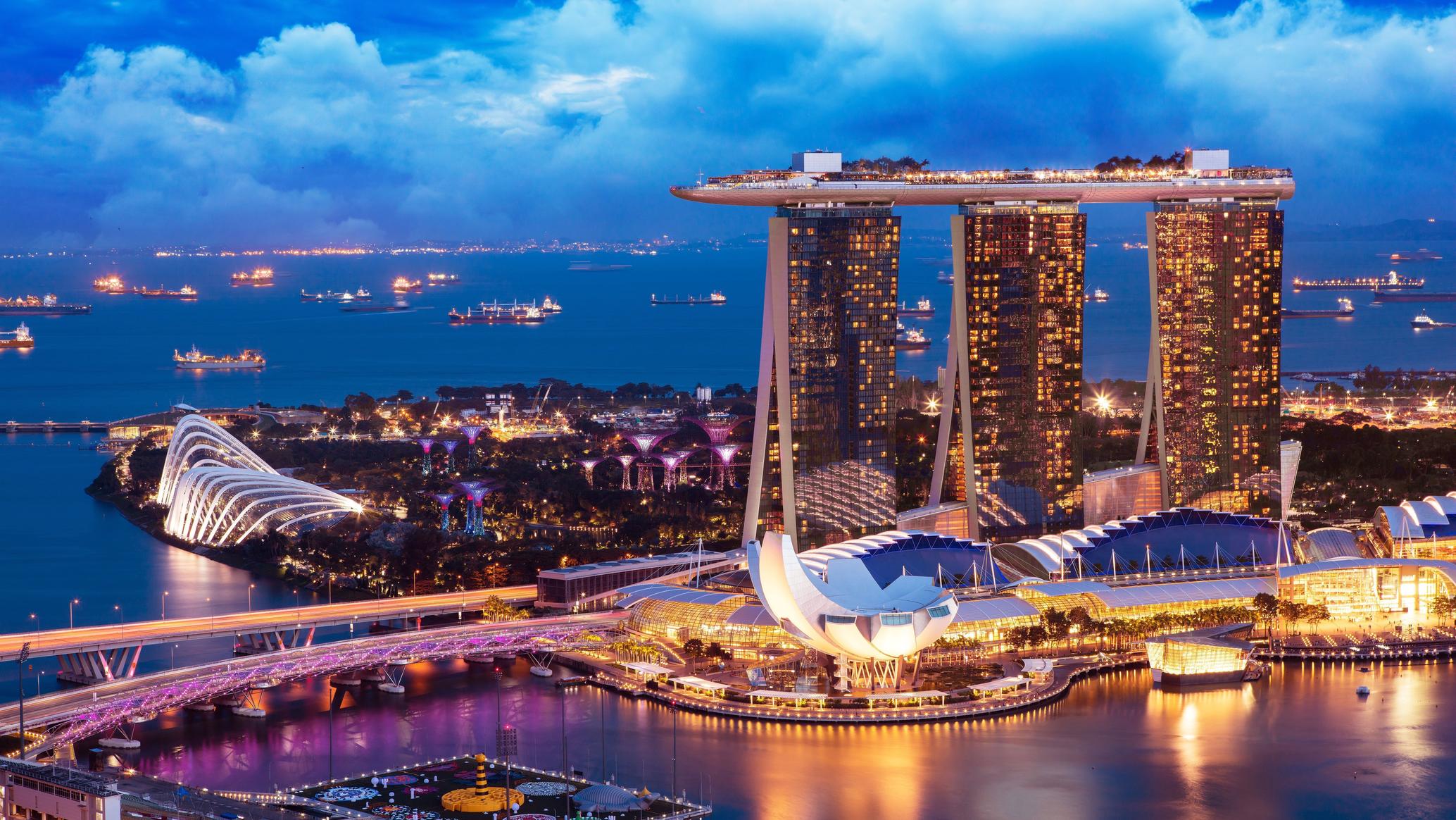
Singapore is a vibrant and dynamic city-state located in Southeast Asia. Known for its impressive skyline, diverse multicultural population, and bustling urban environment, Singapore is a melting pot of cultures, traditions, and experiences. With a rich history and a thriving economy, Singapore has established itself as a global financial hub and a popular tourist destination.
In this article, we will explore 46 fascinating facts about Singapore that will give you a deeper understanding and appreciation of this remarkable country. From its unique blend of Chinese, Malay, and Indian influences to its strict laws and impressive achievements in various fields, Singapore truly has something for everyone.
Whether you are planning a visit to Singapore, curious about its culture and history, or simply seeking to expand your knowledge, join us on this exciting journey through 46 captivating facts that make Singapore truly one of a kind.
Key Takeaways:
- Singapore is a vibrant city-state known for its impressive skyline, diverse culture, and efficient public services. From the iconic Merlion statue to the world-class Changi Airport, Singapore offers a captivating experience for visitors.
- With its commitment to sustainability, rich heritage, and delicious cuisine, Singapore is a must-visit destination. Explore the city’s lush gardens, vibrant neighborhoods, and world-renowned hawker stalls for an unforgettable experience.
Singapore is one of the world’s leading financial hubs.
Boasting a robust economy and a favorable business environment, Singapore has become a major player in the global financial market.
The official languages of Singapore are English, Malay, Mandarin, and Tamil.
This multilingual and multicultural society reflects the diverse ethnic makeup of the country.
Singapore is known for its strict laws and cleanliness.
The government enforces strict regulations to maintain cleanliness and orderliness throughout the city-state.
The famous Merlion statue is an iconic symbol of Singapore.
This mythical creature with the head of a lion and the body of a fish represents Singapore’s history as a fishing village and its status as the Lion City.
Changi Airport in Singapore has been consistently ranked as one of the best airports in the world.
With its state-of-the-art facilities and excellent customer service, Changi Airport provides a seamless travel experience for millions of passengers each year.
Singapore is a melting pot of cuisines.
From flavorful street food to extravagant fine dining, Singapore offers an endless array of culinary delights from various cultures.
The city-state has a well-developed public transportation system.
The Mass Rapid Transit (MRT) and bus network make it easy for residents and tourists to navigate the city conveniently.
Singapore is home to the world’s first night safari.
At the Singapore Zoo, visitors can embark on a unique journey to observe nocturnal animals in their natural habitats.
The National Orchid Garden houses over 1,000 species of orchids.
This stunning garden is a testament to Singapore’s commitment to preserving its rich natural heritage.
Singapore has a thriving arts and culture scene.
The Esplanade – Theatres on the Bay and the Singapore Art Museum are just two examples of the city-state’s dedication to promoting creativity and artistic expression.
Singapore is known for its efficient and reliable healthcare system.
The country’s healthcare system consistently ranks among the top in the world, providing accessible and high-quality medical services to its residents.
Sentosa Island is a popular tourist destination in Singapore.
This resort island offers a host of attractions, including Universal Studios Singapore, S.E.A. Aquarium, and pristine beaches.
Singapore is famous for its impressive skyline.
The Marina Bay Sands hotel and the futuristic Gardens by the Bay are two architectural marvels that dominate the city’s skyline.
The education system in Singapore is highly regarded internationally.
Singapore’s schools consistently perform well in global education rankings, emphasizing academic excellence and holistic development.
The Singapore Sling is a classic cocktail invented in Singapore.
This refreshing drink, made with gin, cherry liqueur, and other tropical flavors, has become an iconic symbol of the city-state.
Singapore has a low crime rate.
The city-state’s strict laws, efficient law enforcement, and community vigilance contribute to its reputation as one of the safest countries in the world.
The Singapore Flyer is one of the largest observation wheels globally, offering panoramic views of the city.
Riding the Singapore Flyer provides a breathtaking experience, especially during sunset.
Singapore has a rich and diverse religious landscape.
From Hindu temples to Buddhist monasteries and Islamic mosques, Singapore embraces religious freedom and fosters interfaith harmony.
The iconic Raffles Hotel is a colonial-style luxury hotel that has been welcoming guests since 1887.
This historic landmark represents the grandeur and elegance of Singapore’s past.
Singapore is a shopping paradise.
From luxury brands on Orchard Road to bustling street markets like Chinatown and Little India, shoppers can find a wide range of goods to suit every budget.
The Singapore Grand Prix is the only night-time Formula One race.
Since 2008, the Marina Bay Street Circuit has hosted this thrilling event, attracting motorsport enthusiasts from around the world.
Singapore’s economy is heavily reliant on international trade.
Its strategic location and excellent connectivity make it a global hub for logistics and commerce.
The National Day Parade is a significant event celebrated annually on August 9th.
It commemorates Singapore’s independence and showcases the country’s achievements and cultural diversity.
The Singapore Botanic Gardens is a UNESCO World Heritage Site.
This lush oasis in the heart of the city offers a tranquil retreat for visitors to relax and appreciate the beauty of nature.
Singapore has one of the highest population densities in the world.
Despite being a small island, Singapore manages to accommodate its growing population with efficient urban planning.
Singapore’s efficient transportation system includes an extensive network of bike lanes and pedestrian-friendly sidewalks.
These initiatives promote a greener and healthier way of commuting within the city.
Hawker centers are a hallmark of Singapore’s food culture.
These bustling food courts offer a wide variety of affordable and delicious local dishes, making Singapore a haven for food lovers.
The National Museum of Singapore showcases the country’s rich heritage and history through its extensive collection of artifacts and exhibitions.
Visitors can gain insights into Singapore’s evolution from a fishing village to a modern metropolis.
Singapore’s Changi Airport has a unique feature: a rooftop swimming pool.
Passengers have the opportunity to take a refreshing dip while waiting for their flights.
The Singapore River plays a significant role in the city’s history.
It was once a vital trade route, and today, it offers scenic boat cruises and waterfront dining options.
Singapore hosts the annual Singapore International Film Festival, showcasing local and international films.
This event draws filmmakers, industry professionals, and film enthusiasts from around the globe.
The Supertrees in Gardens by the Bay are vertical gardens that serve as iconic landmarks and also contribute to Singapore’s sustainability efforts.
These towering structures are fitted with environmentally sustainable functions, such as collecting rainwater and providing solar energy.
The Singapore Zoo is renowned for its commitment to conservation and animal welfare.
Visitors can see various species and learn about the importance of preserving biodiversity.
Singapore is one of the safest cities in the world.
Its low crime rate, strict laws, and efficient law enforcement contribute to its reputation as a safe destination for residents and tourists.
The Singapore Education City is a future development that aims to create a vibrant ecosystem for educational institutions and research facilities.
It will further enhance Singapore’s reputation as an educational hub in the region.
Singapore is home to the world’s largest rooftop orchid garden at the Marina Barrage.
This scenic garden offers panoramic views of the city skyline and showcases various species of orchids.
The Esplanade – Theatres on the Bay is a performing arts center that hosts a wide range of concerts, plays, and cultural performances.
It is a vibrant hub for the arts, attracting both local and international talents.
Singapore is well-known for its efficient and reliable public services.
From healthcare and transportation to security and utilities, the Singapore government places great emphasis on providing high-quality services to its residents.
Singapore has a strong commitment to sustainable development.
Green initiatives, such as the City in a Garden concept and the Water Story, aim to create an environmentally friendly and resource-efficient city.
The vibrant neighborhood of Little India showcases Singapore’s Indian heritage and culture.
From colorful shops selling traditional garments to aromatic Indian cuisine, this enclave offers a taste of India in the heart of Singapore.
Singapore’s efficiency extends to its public transportation system, where commuters can easily access buses, trains, and taxis via smart cards.
This cashless system promotes convenience and accelerates the commuting process.
The Malay cultural enclave of Kampong Glam offers a glimpse into Singapore’s Malay heritage.
Visitors can explore traditional Malay architecture, shop for unique handicrafts, and savor authentic Malay cuisine.
Singapore has a thriving tech startup scene.
The government’s support for innovation and entrepreneurship has attracted numerous tech companies and startups to establish their presence in Singapore.
The Singapore National Stadium is a magnificent venue that hosted the 2010 Summer Youth Olympics.
It continues to host major sporting events, concerts, and performances.
Singapore’s street food has gained international recognition.
Hawker stalls and food courts offer a wide variety of affordable and delicious dishes, from the famous Hainanese chicken rice to savory chili crab.
Singapore’s commitment to environmental sustainability is evident in the Gardens by the Bay.
These stunning waterfront gardens feature sustainable practices, such as rainwater harvesting and solar energy, while showcasing diverse flora and fauna.
These 46 facts about Singapore highlight the country’s remarkable achievements, cultural diversity, and commitment to excellence. Whether it’s the world-class architecture, delectable cuisine, or efficient infrastructure, Singapore continues to captivate visitors from around the world. Explore and experience the Lion City for yourself!
Conclusion
In conclusion, Singapore is a truly remarkable country with a rich culture, thriving economy, and stunning architecture. It has become a global hub for business, tourism, and education, attracting people from all over the world. From its magnificent skyscrapers to its lush green spaces, there is something for everyone in this vibrant city-state. Whether you’re exploring the bustling streets of Chinatown, relaxing on the beautiful beaches of Sentosa, or indulging in the diverse local cuisine, Singapore offers a unique and unforgettable experience. With its efficient public transportation system, impeccable cleanliness, and commitment to sustainability, Singapore sets an example for other nations to follow. So why wait? Start planning your trip to Singapore and discover the many wonders this enchanting country has to offer.
FAQs
1. What is the official language of Singapore?
The official languages of Singapore are English, Malay, Mandarin Chinese, and Tamil.
2. Do I need a visa to visit Singapore?
It depends on your nationality. Many countries have a visa waiver agreement with Singapore, allowing visitors to enter for a limited period without a visa.
3. What is the currency of Singapore?
The currency of Singapore is the Singapore Dollar (SGD).
4. Is Singapore a safe country to visit?
Yes, Singapore is considered one of the safest countries in the world with low crime rates and strict laws.
5. What is the best time to visit Singapore?
The best time to visit Singapore is during the months of February to April when the weather is pleasant and there are various festivals and events taking place.
6. What are some must-visit attractions in Singapore?
Popular attractions in Singapore include the Gardens by the Bay, Marina Bay Sands, Sentosa Island, Universal Studios Singapore, and the Merlion Park.
7. Is tap water safe to drink in Singapore?
Yes, tap water is safe to drink in Singapore as it undergoes rigorous purification processes.
8. Can I use public transportation to get around Singapore?
Yes, Singapore has an efficient and well-connected public transportation system consisting of buses, MRT (Mass Rapid Transit), and taxis.
9. Are there any cultural customs or etiquette I should be aware of in Singapore?
In Singapore, it is important to be respectful of the local customs, such as removing your shoes before entering someone’s home and avoiding public displays of affection.
10. What is the legal drinking age in Singapore?
The legal drinking age in Singapore is 18 years old.
Was this page helpful?
Our commitment to delivering trustworthy and engaging content is at the heart of what we do. Each fact on our site is contributed by real users like you, bringing a wealth of diverse insights and information. To ensure the highest standards of accuracy and reliability, our dedicated editors meticulously review each submission. This process guarantees that the facts we share are not only fascinating but also credible. Trust in our commitment to quality and authenticity as you explore and learn with us.


